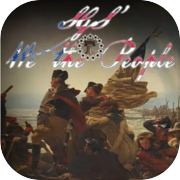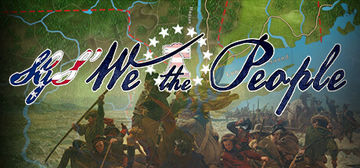SGS We The People

We The PeopleSGS We The People is a complete stand-alone game that covers the American Revolutionary war from April 1775 to September 1783
The game covers the whole war from 1775, using a system of two week turns. …
The players have to use wisely their financial resources to spend their resources in new units or in replacements for weakened units to avoid their destruction. But it is not possible to rebuild every lost unit or to replace it. Cards play also a key role in the game as they bring some variation in the different fields, such as reinforcements, economics, diplomacy, politics, popular support and, above all, combat.
The player will also find in the game nice historical events that bring ‘chrome’ to the game and helps you to feel the historical moment represented.
The knowledge, experience and background of the designer, Stephen Dunn, has been essential in creating and supporting the development of this game, assisted by the SGS team. A lot of bibliography and data was collected to support the research needed to develop this game so that it feels accurate.
We plan to also provide the players with interesting options to explore potential what-if situations.
The Scenarios
The goal of the game is to recreate the different phases of the war, either in a complete grand campaign covering the whole actual duration, or in shorter scenarios set at different starting points, such as:
1775 Grand Campaign: The entire war, starting with the Militia army facing the British Army in Boston following the skirmishes at Lexington and Concord, and ending with the Treat of Paris in 1783. This campaign scenario lasts 104 months (May 1775 to December 1783). [208 turns]
1775 Canada Invasion: The scenario covers the aborted attempt by the Americans to conquer Canada during the fall and winter of 1775. It was the first major military initiative by the Americans during the Revolutionary War. After some early success by revolutionary forces, British and Canadian forces totally defeated the invasion. This scenario lasts 7 months (September 1775 to March 1776) [14 turns]
1777 Saratoga Scenario: In the summer of 1777, the British launched a new expedition from Canada. Led by General Burgoyne, the intention was to seize the Lake Champlain and Hudson River corridor, effectively isolating New England from the rest of the American colonies. This scenario lasts 7 months (May 1777 to November 1777). [14 turns]
1779 The Clinton-Sullivan Campaign: The frontier war in Upper New York, focusing on Indian warfare. This scenario lasts 14 months (July 1778 to September 1779). [28 turns]
1781 Southern Campaign: The scenario covers both the famous campaigns of general Greene in the Deep South to stalemate a superior British army in early 1781 and the manoeuvrers throughout Virginia that ended up with the siege and surrender of British forces under Gen. Cornwallis at Yorktown. This scenario lasts 9 months (March to November 1781). ]18 turns]
Scale
The game scale is at the regimental level for land units of both sides, with smaller units (e.g. garrisons, ) being also present.
Naval units are present, generally representing squadrons of 3-4 ships. The British Navy is powerful, but stretched by many responsibilities. The American Navy is small, focusing on blockade running and raids on British Trade fleets. The entry of France into the war brings strong French land and naval forces
Other items such as fortifications and supply units [wagons and depots] are also present in good numbers.
The map covers North America from the Caribbean sea to Hudson Bay, and from the east coat to portions of the Louisiana Territory. “Odd Map Boxes” represent Trade Rooures as well as critical regions of Europe and Caribbean Islands
All natural types of terrain of the peninsula are present, as well as a new model of weather system, showing map changes when it rains or snows, and with the relevant impact on military operations.
The Economy
Both sides earn money through control of certain regions.
British Trade routes give regular income, but the Americans can gain income by sinking trade ships.
Purchases are limited to Cards, Replacements and mobile Supply units;
Players and Sides
One player represents the British army with Hessian and Brunswick mercenaries, supported by Tory Militia, and the other plays the American Colonies, mostly Militia, with eventual involvement of French and Spanish troops and ships.
The British have modest land forces at the start of the game, and the ongoing reinforcements are impressive. The Royal Navy is powerful, but is responsible for protecting trade as well as supporting the army. Their economic might is important and can compensate for the lower numbers.
The American player must slow the initial invasion, waiting for American reinforcements to alter the course of events. Survival, and protecting important locations are critical
Players will enter detailed military operations and battles (both on land and sea)
In the military field, you have to handle troop movements and manoeuvrers, organization of HQ and artillery supports, breakthroughs, exploitations, build-up of logistical networks or fortified lines.
As the British, the uncertainty as to when French (and Spanish) intervention will occur in the game (an almost certain outcome, but at an unknown date) will be a decisive factor for your military campaign. On the American side, the amount and timing of French support, depends on your success slowing the British campaigns, and diplomatic activity in France.
Duration
Estimated Playtime: from 1h to many hours…
Favored Side: none.
Hardest to Play: none.
Balance
No side is specifically advantaged. Both are playable and enjoyable once you capture the essence of their specific strong points and weaknesses. Detailed scenario information sheets are here to help you get into the game.
The game covers the whole war from 1775, using a system of two week turns. …
The players have to use wisely their financial resources to spend their resources in new units or in replacements for weakened units to avoid their destruction. But it is not possible to rebuild every lost unit or to replace it. Cards play also a key role in the game as they bring some variation in the different fields, such as reinforcements, economics, diplomacy, politics, popular support and, above all, combat.
The player will also find in the game nice historical events that bring ‘chrome’ to the game and helps you to feel the historical moment represented.
The knowledge, experience and background of the designer, Stephen Dunn, has been essential in creating and supporting the development of this game, assisted by the SGS team. A lot of bibliography and data was collected to support the research needed to develop this game so that it feels accurate.
We plan to also provide the players with interesting options to explore potential what-if situations.
The Scenarios
The goal of the game is to recreate the different phases of the war, either in a complete grand campaign covering the whole actual duration, or in shorter scenarios set at different starting points, such as:
1775 Grand Campaign: The entire war, starting with the Militia army facing the British Army in Boston following the skirmishes at Lexington and Concord, and ending with the Treat of Paris in 1783. This campaign scenario lasts 104 months (May 1775 to December 1783). [208 turns]
1775 Canada Invasion: The scenario covers the aborted attempt by the Americans to conquer Canada during the fall and winter of 1775. It was the first major military initiative by the Americans during the Revolutionary War. After some early success by revolutionary forces, British and Canadian forces totally defeated the invasion. This scenario lasts 7 months (September 1775 to March 1776) [14 turns]
1777 Saratoga Scenario: In the summer of 1777, the British launched a new expedition from Canada. Led by General Burgoyne, the intention was to seize the Lake Champlain and Hudson River corridor, effectively isolating New England from the rest of the American colonies. This scenario lasts 7 months (May 1777 to November 1777). [14 turns]
1779 The Clinton-Sullivan Campaign: The frontier war in Upper New York, focusing on Indian warfare. This scenario lasts 14 months (July 1778 to September 1779). [28 turns]
1781 Southern Campaign: The scenario covers both the famous campaigns of general Greene in the Deep South to stalemate a superior British army in early 1781 and the manoeuvrers throughout Virginia that ended up with the siege and surrender of British forces under Gen. Cornwallis at Yorktown. This scenario lasts 9 months (March to November 1781). ]18 turns]
Scale
The game scale is at the regimental level for land units of both sides, with smaller units (e.g. garrisons, ) being also present.
Naval units are present, generally representing squadrons of 3-4 ships. The British Navy is powerful, but stretched by many responsibilities. The American Navy is small, focusing on blockade running and raids on British Trade fleets. The entry of France into the war brings strong French land and naval forces
Other items such as fortifications and supply units [wagons and depots] are also present in good numbers.
The map covers North America from the Caribbean sea to Hudson Bay, and from the east coat to portions of the Louisiana Territory. “Odd Map Boxes” represent Trade Rooures as well as critical regions of Europe and Caribbean Islands
All natural types of terrain of the peninsula are present, as well as a new model of weather system, showing map changes when it rains or snows, and with the relevant impact on military operations.
The Economy
Both sides earn money through control of certain regions.
British Trade routes give regular income, but the Americans can gain income by sinking trade ships.
Purchases are limited to Cards, Replacements and mobile Supply units;
Players and Sides
One player represents the British army with Hessian and Brunswick mercenaries, supported by Tory Militia, and the other plays the American Colonies, mostly Militia, with eventual involvement of French and Spanish troops and ships.
The British have modest land forces at the start of the game, and the ongoing reinforcements are impressive. The Royal Navy is powerful, but is responsible for protecting trade as well as supporting the army. Their economic might is important and can compensate for the lower numbers.
The American player must slow the initial invasion, waiting for American reinforcements to alter the course of events. Survival, and protecting important locations are critical
Players will enter detailed military operations and battles (both on land and sea)
In the military field, you have to handle troop movements and manoeuvrers, organization of HQ and artillery supports, breakthroughs, exploitations, build-up of logistical networks or fortified lines.
As the British, the uncertainty as to when French (and Spanish) intervention will occur in the game (an almost certain outcome, but at an unknown date) will be a decisive factor for your military campaign. On the American side, the amount and timing of French support, depends on your success slowing the British campaigns, and diplomatic activity in France.
Duration
Estimated Playtime: from 1h to many hours…
Favored Side: none.
Hardest to Play: none.
Balance
No side is specifically advantaged. Both are playable and enjoyable once you capture the essence of their specific strong points and weaknesses. Detailed scenario information sheets are here to help you get into the game.
Available on devices:
- Windows





























































